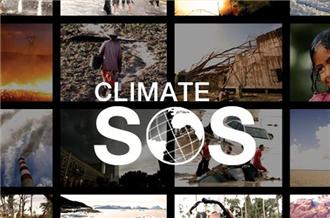|
Doha, Qatar - The proposals often seem like science
fiction: Attempting to simulate the effects of volcanos to block the sun's
rays, dumping loads of iron sulphate into oceans, and sending hot air
balloons high into the stratosphere to spray aerosol chemicals in an
attempt to cool the planet.
Welcome to the whacky world of geoengineering. As political leaders
enter another round of climate change negotiations from November 26 to
December 7 in Qatar, the concept of humans, or nation states, unilaterally
trying to alter the environment is gaining traction among some scientists
and policymakers.
Despite 17 high-profile international summits aimed at combatting
climate change, global greenhouse gas emissions have risen 48 per cent
since the first Earth Summit in 1992, according to the US Energy
Information Administration.
Some scientists believe the fight to keep
world temperatures from rising less than two degrees Celsius - the
rate needed to avoid a feedback loop known as "runaway climate change" -
has already been lost.
"I don't see the international community doing anything substantive to
reduce emissions," Ken Caldeira, a climate expert with the Carnegie
Institution for Science, told Al Jazeera. "If something really bad starts
happening, the solar geoenginering approaches are the only game in town
that can do things within a few years."
Is it too late?
Global carbon dioxide emissions rose 3 per cent to 34 billion tonnes in
2011, according to a recent EU report, undermining the goal of limiting
average global temperature rises.
If humans have made the climate warmer with our actions, we should also
have the technology to cool it down, proponents believe.
 |
| Follow our
in-depth coverage of Doha COP18
negotiations |
"Geoengineering should be seen … as a way to fill the gap between a
desired technology target and what can actually be achieved given all the
hurdles," Tom Wigley, an environmental scientist at the University of East
Anglia in the UK, told Al Jazeera. He says it could be a stop-gap measure
to stem the possibility of disastrous climate change, until humans can
develop new technologies to produce clean energy.
John Holdren, science adviser to US President Barack Obama, supports
further research into geoengineering.
Normally broken down into two broad categories, geoengineering includes
solar radiation management (SRM) - that aims to reduce incoming heat from
the sun - and carbon dioxide removal, often considered less controversial,
to take existing greenhouse gases out of the atmosphere.
But idea of countries or companies taking it upon themselves to alter
the climate raises plenty of scientific and moral questions. Some
environmentalists liken the concept to "Frankenstein" as humans try to
re-design life-sustaining ecosystems with potentially dangerous
consequences.
"There have been various attempts to modify weather," Damon Matthews, a
professor of geography at Canada's Concordia University who contributed to
the UN's Intergovernmental Panel on Climate Change (IPCC). "During the
2008 Olympics, China tried to avoid rainfall through climate
modifications.
"In the past, there have been small scale attempts to modify the
climate," Matthews told Al Jazeera. "But there is no historical analogy
for the things people are talking about now."
'Fertilising' the ocean
The largest geoengineering experiment to date, according to reports,
happened in July in the waters off Canada's Pacific coast. Californian
Russ George dumped iron sulphate into the ocean, triggering a plankton
bloom covering up to 10,000 square kilometers. The technique, known as
ocean fetilisation, was designed to absorb carbon dioxide, potentially
netting the businessman lucrative carbon credits under an emissions
trading scheme.
"Various private firms have picked up these plans as potential
for-profit ventures," Matthews said.
Local indigenous people initially backed the project as they believed
they were signing onto a plan to enhance salmon stocks. Dependent on fish
and other marine life for food, officials from the Haidia First Nation
have said they felt cheated by George and his geoengineering scheme.
 |
| Climate
change is already costing the world economy more than $1.2 trillion
per year [Al Jazeera] |
Such projects can "radically change" ocean ecosystems, Matthews said
and the effects are "difficult to predict".
Past attempts by humans to modify the balance of ecosystems haven't
always worked out well.
While there is no formal international convention on geoengineering,
the plankton plan should have been regulated under the London Convention
governing ocean pollution, Todd Sanford, a climate specialist with
the Union of Concerned Scientists, told Al Jazeera.
"The Convention on Biological Diversity adopted a moratorium on
geoengineering activities, but this is in no way legally binding," Sanford
said.
July's massive ocean dump in Canada was the exception, rather than the
norm, as most experiments are done through computer simulations.
"Geoengineering experiments really haven't moved into the real world,
yet, because of many questions concerning [the] risk of unintended
consequences and governance," Sanford said.
Economic costs
Supporters of geoengineering point to the 1991 eruption of mount
Pintabuo in the Philippines as an example of naturally occurring sulpher
dioxide entering the high-atmosphere and reflecting the sun's light away
from the earth to cool the planet.
|
Unforeseen
consequences aside, starting this aerosol technology could become
addictive. "Once you get this going you have to keep it going
otherwise you will get a very rapid recovery of
warming."
- Todd Sanford, climate
specialist with the Union of Concerned
Scientists
|
Between 1992 and 1993, the amount of
sunlight reaching the earth's surface was reduced by about 10 per cent
because of the volcano, leading some scientists to believe humans could
replicate the process without too much difficulty.
"Had material from that volcano remained in the atmosphere, the earth
might have cooled 3 or 4 degrees," Caldeira said.
Climate change is already costing the world economy more than $1.2
trillion per year, according Climate Vulnerability Monitor: A Guide to the Cold
Calculus of a Hot Planet, a study published in September
by 50 leading scientists and economists.
In contrast, the cost of organising a geoengineering scheme where
airplanes or hot air balloons disperse particles to reduce the amount of
sunlight hitting earth is estimated at less than $5bn per year, according
to a paper published in the journal Environmental Research
Letters in August.
"Injecting stratospheric aerosols would like give a rapid cooling and
would be relatively inexpensive," Sanford said of technology designed to
"mimic volcanoes".
"However, these methods also carry a great deal of risk as they may
affect precipitation patterns and stratospheric ozone depletion." These
schemes could also lead to a white haze covering the sky, while increasing
ocean acidification that kills sea life and off-balances
ecosystems.
Unforeseen consequences aside, starting this aerosol technology could
become addictive, Stanford said. "Once you get this going you have to keep
it going otherwise you will get a very rapid recovery of warming."
South vs North
Global warming will affect some countries more than others, with poor
regions in the global south expected to face the worst consequences. Some
experts worry that politicians in large developing nations, such as
Indonesia or China, could be compelled to try and alter the climate if
extreme temperatures or droughts wipe out food supplies, sparking domestic
unrest.
In one of the bizarre ironies of climate change, wealthy northern
countries, including Canada, Russia and parts of the US could benefit from
global warming, as new land becomes open to farming, while melting ice in
the Arctic opens trade routes and new sources of petroleum.
Countries that have the least responsibility for the climate crisis,
and who suffer the most from its effects, could become vocal proponents of
geoengineering.
"If the rich countries don't come to the aid of the poor countries, a
coalition of tropical countries could say 'you rich people have messed up
our climate and made it difficult to feed our people, so we are going to
take matters into our own hands,'" Caldeira said. "To me, this is the most
likely scenario of how a geoengineering scheme might be deployed."
On November 19, the World Bank released a report titled Turn
Down the Heat, warning global poverty cannot be properly
addressed without tackling climate change. If current emissions continue,
the World Bank forecasts a temperature rise of more than 4 degrees Celsius
by the end of the century. Under this scenario, extreme weather will be
the "new normal". Sea levels would rise about one metre, inundating poor
countries including Vietnam and Bangladesh. Falling crop yields would
compound hunger and poverty, the World Bank said.
If crops fail, people starve and governments begin to fall, countries
could use the "threat of geoengineering" as a "bargaining chip" to get aid
from other states, Caldeira said.
'Plant a tree'
International rules on climate experiments are murky at best, and
non-existent at worst. And even if the UN or some other body came up with
a comprehensive framework, that doesn't guarantee responsible
behavior.
"As we saw with the invasion of Iraq, international law doesn't mean
very much when a group of powerful countries decide to do something,"
Caldeira said. "If powerful countries felt their backs were against the
wall, I could imagine them deploying something. If China was having crop
failures and heat waves for years, it would seem hard for politicians not
to deploy something to protect their people from suffering if the science
was there."
Currently, the science is shaky and researchers are pushing for
increased funding. This worries some environmentalists. They believe
putting money into these technologies constitutes a "moral hazard" as
countries won't seriously curb emissions if they believe humans will be
able to "play God" by altering the climate.
"In so far as there are limited resources to be spent on the climate
problem, I would prefer to see them spent on solutions to limit greenhouse
gas emissions, rather than geoengineering," Matthews said.
|
"The simplest
carbon dioxide removal approach is to plant a
tree."
- Ken Caldeira,
Carnegie Institution for
Science
|
There is little doubt that human activity is warming the planet. Jim
Young Kim, the World Bank's president, said 97 per cent of scientists
agree on the reality of climate change. Greenhouse gas emissions are
rising. And, if history provides lessons on the future, COP18 will not
change the reality of a world addicted to fossil fuels, and people
demanding economic growth over environmental sustainability.
Even if humans drastically reduced emissions today, the climate will
continue warming for several decades before the effects would be felt.
Politicians, who are usually elected for five-year terms, will be under
pressure to get fast results from angry constituents - and geoengineering
seems an appealing solution.
Rather than sending balloons into the atmosphere or iron into the sea
with possibly disastrous consequences, Calderia said there are easier and
more positive ways for humans to alter the climate to stem global
warming.
"The simplest carbon dioxide removal approach is to plant a tree," he
said.
2002 |